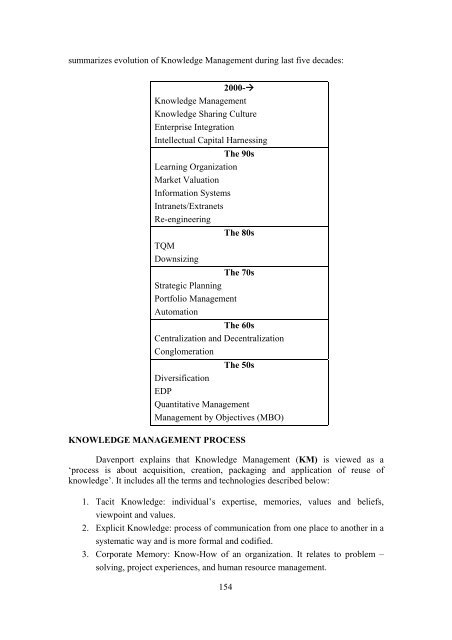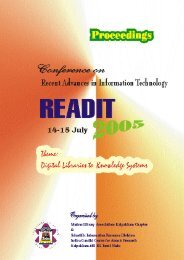- Page 1 and 2:
Conference on Recent Advances in In
- Page 3 and 4:
CONTENTS INVITED TALKS “Bodhi”
- Page 5 and 6:
Dr. Sanjay K Kaushik and Vijendra S
- Page 7 and 8:
Tacit Knowledge Contextual Mental P
- Page 9 and 10:
documents can become knowledge repo
- Page 11 and 12:
objects to form a conceptual networ
- Page 13 and 14:
Global highly competitive fast ch
- Page 15 and 16:
knowledge would always be packaged
- Page 17 and 18:
If our human filters are all too mu
- Page 19 and 20:
6. Booch, G. (1993). Object-Oriente
- Page 21 and 22:
development (Balyan, R.K. 2007). Th
- Page 23 and 24:
4. NEW FOUND ROLES / RESPONSIBILITI
- Page 25 and 26:
human resource development in the k
- Page 27 and 28:
Those librarians who have the neede
- Page 29 and 30:
of information using formal and inf
- Page 31 and 32:
high quality information and by net
- Page 33 and 34:
and underpin information management
- Page 35 and 36:
everywhere on the Internet, existin
- Page 37 and 38:
11. RESOURCES SHARING AND NETWORKIN
- Page 39 and 40:
influence the organization’s know
- Page 41 and 42:
KNOWLEDGE MANAGEMENT IN DIGITAL INF
- Page 43 and 44:
Thirdly Knowledge Management promot
- Page 45 and 46:
6. KNOWLEDGE MANAGEMENT: COMMON AND
- Page 47 and 48:
7. KNOWLEDGE MANAGEMENT SOLUTION IN
- Page 49 and 50:
Knowledge and Information Managemen
- Page 51 and 52:
to a broad collection of organizati
- Page 53 and 54:
Information technology is a tool fo
- Page 55 and 56:
In the library world, there is a le
- Page 57 and 58:
more science in public domain. Seve
- Page 59 and 60:
Web-of Science which covers Science
- Page 61 and 62:
Creation of digital contents and in
- Page 66 and 67:
University Libraries - Metamorphosi
- Page 68 and 69:
• Management skills - motivating,
- Page 70 and 71:
KM will play an essential role, and
- Page 72 and 73:
4. INDUSTRIAL SAFETY AND HEALTH INF
- Page 74 and 75:
Safety Knowledge Management System
- Page 76 and 77:
Multimedia Data Mining in Digital L
- Page 78 and 79:
The Multimedia Data Mining (MDM) is
- Page 80 and 81:
performed at the global or local le
- Page 82 and 83:
REFERENCES 1. Sinha, Manojkumar and
- Page 84 and 85:
- Information explosion - Prolifera
- Page 86 and 87:
also go together for adding visual
- Page 88 and 89:
6.2 Format This refers to the abili
- Page 90 and 91:
Using Knowledge mapping to support
- Page 92 and 93:
- Be aware of organizational level
- Page 94:
application of knowledge providing
- Page 99 and 100:
By implementing these strategies, t
- Page 101 and 102:
detectors are suitable for detectin
- Page 103 and 104:
iii) Response Indicator II. Confirm
- Page 105 and 106:
5. CONCLUSION Present day libraries
- Page 107 and 108:
The objective of the archives is: 1
- Page 109 and 110:
custody and two copies are made for
- Page 111 and 112:
DIGITAL PRESERVATION ISSUES AND FAL
- Page 113 and 114:
epresentation, provenance, fixity a
- Page 115 and 116:
) Technical c) Resource challenges.
- Page 117 and 118:
There are many cost factors to cons
- Page 119 and 120:
This knowledge would vanish from th
- Page 121 and 122:
The key issues were: - Development
- Page 123 and 124:
as there would be changes in compet
- Page 125 and 126:
Digital Preservation and Online Acc
- Page 127 and 128:
Physical deterioration of digital m
- Page 129 and 130:
7. POLICIES FOR DIGITIZATION 1. Meg
- Page 134 and 135: Library 2.0: Myth or Reality ? E.So
- Page 136 and 137: Web 1.0 Web 2.0 DoubleClick --> Goo
- Page 138 and 139: and chooses tagging, tag clouds, fo
- Page 140 and 141: and access can be given through com
- Page 142 and 143: writes, injures, defaces, cuts, mut
- Page 144 and 145: to have access to restricted areas.
- Page 146 and 147: Internet Usage by Research Scholars
- Page 148 and 149: Kumar and Amritpal Kaur (2004) 5 st
- Page 150 and 151: whereas fifteen respondents use it
- Page 152 and 153: Fully satisfied Table 12 Satisfacti
- Page 154 and 155: Information Security: The role of D
- Page 156 and 157: Identifier Owner suffix 10-1003 / 0
- Page 158 and 159: is costly affair. However, it is a
- Page 160 and 161: (IR) and providing their own digita
- Page 162 and 163: As per the data of Home Ministry of
- Page 164 and 165: 4.8 Cyber Defamation: Cyber defamat
- Page 166 and 167: 4.18 Web jacking Forceful taking of
- Page 168 and 169: Under the circumstances, the Librar
- Page 170 and 171: 10. CONCLUSION Cyber crimes in Indi
- Page 172 and 173: 2. STATE AGRICULTURAL UNIVERSITIES
- Page 174 and 175: Table- 2: Library Network facilitie
- Page 176 and 177: Table- 4: OPAC / Web OPAC Facilitie
- Page 178 and 179: 6.6 Electronic surveillance Librari
- Page 182 and 183: Knowledge Management in Academic In
- Page 186 and 187: To prove their relevance and value,
- Page 188 and 189: functions of the organization. Patr
- Page 190 and 191: Knowledge Communication in Academic
- Page 192 and 193: y way of conferring it the status o
- Page 194 and 195: through face-to-face conversation.
- Page 196 and 197: hurdles. Instant message are delive
- Page 198 and 199: Knowledge communication network of
- Page 200 and 201: As KM and learning activities for o
- Page 202 and 203: • Operation personnel are require
- Page 204 and 205: Figure-2: Home page for Centralised
- Page 206 and 207: Glossary Development Figure-4: Home
- Page 208 and 209: Extension of Qualification Systems
- Page 210 and 211: Nuclear Knowledge Management (NKM)
- Page 212 and 213: Knowledge Sharing Environment (1) B
- Page 214 and 215: already possess it. As those worker
- Page 216 and 217: - identify critical “at risk” k
- Page 218 and 219: open literature, content and TOC cr
- Page 220 and 221: FROM MANAGEMENT OF ORGANIZATIONAL K
- Page 222 and 223: Organizational Knowledge Organizati
- Page 224 and 225: Central Repository Data + Informati
- Page 226 and 227: The infrastructure based approach i
- Page 228 and 229: The ‘System Quality’ refers to
- Page 230 and 231: KNOWLEDGE: A MARKETABLE COMMODITY A
- Page 232 and 233: APPLYING E-COMMERCE TO E-LEARNING E
- Page 234 and 235:
Role of Libraries in the Knowledge
- Page 236 and 237:
their scholars to post their articl
- Page 238 and 239:
Author Index Amudhavalli, A., 143 A

















